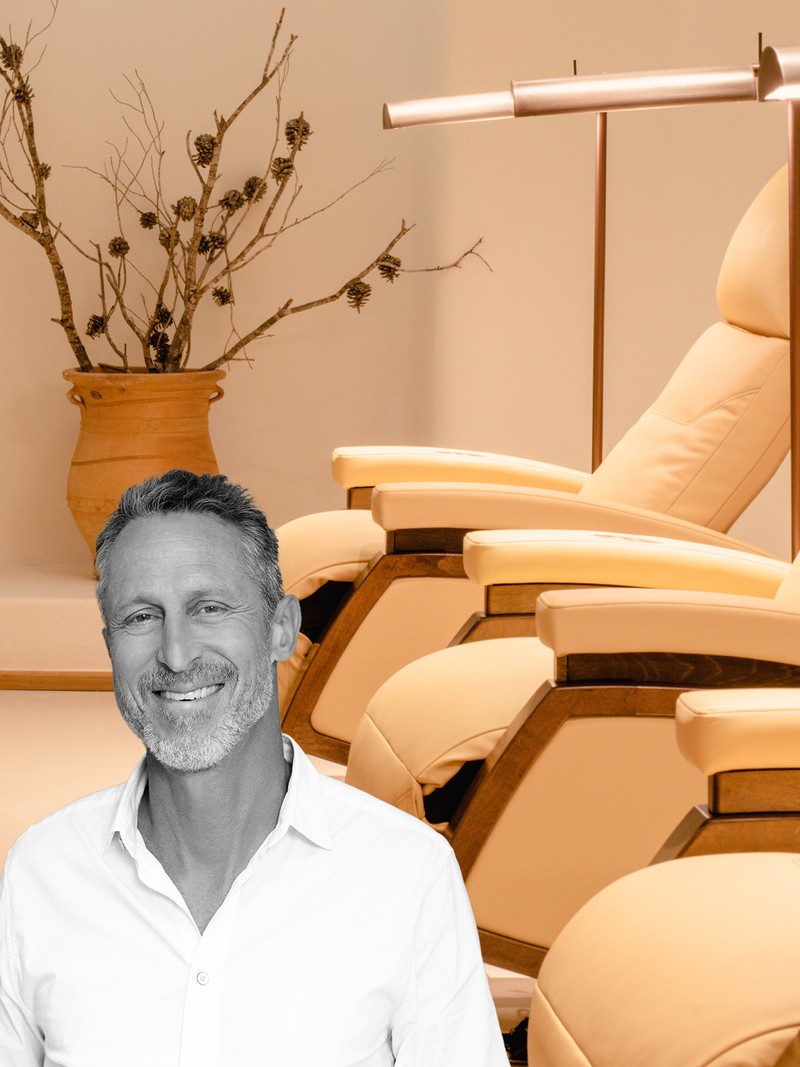
What To Do If You Want To Live Longer
Medicine focuses on treating disease – but that’s not real health. True wellness means building resilience long before illness strikes. I call it scientific wellness: the art and science of creating a long, vibrant ‘healthspan’. It’s not just about living longer – it’s about feeling great for as many of those years as possible.
The human body has extraordinary healing potential. To build true health, you have to focus on the foundations: nutrition, movement, sleep and stress management. But there’s so much more that can activate the body’s built-in repair and regeneration systems. Fasting is one of the simplest ways to switch on your body’s built-in longevity systems. Intermittent fasting – 16 hours without food – triggers autophagy, the body’s self-cleaning process. Like hitting the self-cleaning oven button, it breaks down old cells, reduces inflammation and boosts metabolic health.
Not all stress is bad. Chronic mental stress depletes you, but hormetic stress – from fasting, cold or heat exposure – actually makes you stronger. These small, controlled stressors switch on repair pathways, helping the body clean, adapt and grow. The result? Sharper focus, more energy, greater resilience.
The wrong kind of stress is a silent driver of disease. High cortisol can feel like you're in overdrive all the time – anxious, wired, inflamed. But what happens next is even worse: over time, you burn out. Your adrenal system flattens, cortisol bottoms out, and your body struggles to get going. You lose that natural morning energy spike, the rhythm that should carry you through the day and drop at night so you can rest. Fortunately, there’s a lot you can do to rebalance – think meditation, breathwork, yoga, time in nature and connection. Rhythmic sleep patterns – going to bed and waking at the same time – is a simple but powerful way to train cortisol rhythms naturally, as is having a proper wind-down routine. A hot bath with magnesium salts can also lower stress hormones and prepare the body for deep sleep.
The toxin burden we carry is far higher than most people realise. Aside from diet and blood sugar imbalances, toxic load is probably the biggest driver of chronic illness today. Even when you eat clean and filter your water, chemicals like BPA, heavy metals and pesticides show up in blood tests – including mine. Supporting detoxification through colourful veg, fibre, hydration, sweat and sleep is key. Saunas, exercise, and supplements like glutathione can also help the body clear its load.
First, support detoxification through food. Colourful vegetables, cruciferous greens, fibre, and plenty of fluids support elimination, as well as sweating, breathing deeply, and regular bowel movements. Saunas also help dramatically, exercise supports lymphatic flow, and sleep is when the brain clears toxins. Targeted supplements like glutathione – the body’s master antioxidant – can also help.
At RoseBar, we mix ancient wisdom with cutting-edge tech. Hyperbaric oxygen therapy is one of the most exciting longevity tools I’ve seen. It’s been studied extensively and shown to kill ‘zombie’ cells – the damaged, ageing cells that cause chronic inflammation. Ozone and hypoxia training make cells tougher; red light and cryotherapy speed repair; IV drips aid recovery. Our latest tool – the Human Regenerator – helps rewire the nervous system from chronic stress to calm.
Longevity starts with food. Most of us eat an inflammatory, ultra-processed diet that keeps insulin levels high – and chronically high insulin is the driver behind almost every disease, like cancer, heart disease, dementia, diabetes and even infertility. If you cut out sugar, alcohol, refined starches, processed grains and inflammatory oils – replacing with vegetables, nuts, seeds, high-quality protein, fruit, olive oil and healthy fats – the impact on the body is rapid. Insulin drops, inflammation lowers and the microbiome resets. When you ditch the processed junk and eat real food, the body recalibrates naturally, without the need for medication.
Muscle is life. It’s your metabolic engine, your glucose sink, and your protection against frailty and falls. But the older you get, the harder it is to build and maintain muscle – so you have to work at it. That means strength training at least three times a week, and getting enough high-quality protein – usually around 1g per pound of body weight – to stimulate muscle synthesis. Without this, you lose muscle fast, and with it goes your metabolism, your insulin sensitivity, and your resilience. Aim to lift weights 30 minutes, three times a week, at a minimum. When it comes to cardio, aim for 150 minutes weekly, but it doesn’t have to be intense – walking counts. For longevity, include VO2 max training – short bursts of high-intensity sprinting or fast effort that pushes your aerobic capacity. This kind of training boosts mitochondrial and cardiovascular health.
Flexibility and stability are overlooked but just as vital. Fitness boils down to four pillars: strength, cardiovascular fitness, flexibility and stability, but the latter two are often forgotten. Each pillar is crucial for maintaining peak health. Do more yoga, stretching and core work to prevent injury and improve balance. You can do all the strength and cardio in the world, but without stability exercises to correct imbalances and improve coordination, you risk falls or injury.
Sleep is non-negotiable. A bad night’s sleep throws off your hormones, raises cortisol, spikes insulin and increases hunger the next day. Long term, poor sleep drives ageing faster than almost anything. During deep sleep, the brain cleanses, muscles recover and cells repair. Without that nightly reset, every system suffers. Good sleep hygiene – a dark, cool room and no screens late at night – is essential for longevity.
Mindset also matters. Stress isn’t just what happens to you – it’s how you interpret it. Most people don’t realise that the body reacts the same way to an imagined threat as it does to a real one. Whether you’re being chased by a lion, or you think your partner is angry because they haven’t texted back, your body mounts the same fight-or-flight response. Learning to manage your thoughts, mindset and inner narrative is crucial to lowering chronic stress and protecting your health.
Smart supplements can make a difference. I don’t believe in taking endless pills, but there some nutrients with strong evidence for supporting longevity. MitoPure, which I sell through my website, helps improve mitochondrial health, while Fatty15 – a newly discovered essential fatty acid – shows promise for cellular health. Vitamin D, omega-3, curcumin and NAD precursors like NMN can also support energy production and repair processes. These aren’t magic bullets, but they can help extend your healthspan.
My daily routine reflects everything I teach. I start the day with journalling – some quiet, meditative time to set my mind straight. Then I train – strength and cardio, to build and preserve muscle. Afterwards, I make a protein shake: goat whey, creatine (which is fantastic for both brain and muscle), MitoPure for mitochondrial health, and other longevity nutrients. I take a carefully chosen stack of supplements – mitochondrial support, anti-inflammatories and NAD boosters. At home, I’m fortunate to have built a wellness studio in my garage. I use a sauna and cold plunge most days, plus hyperbaric oxygen, PEMF mats, red light therapy and hypoxia training – all of which support cellular repair, reduce inflammation, and stimulate longevity pathways. Sleep is non-negotiable: I aim for eight hours a night, same bedtime and wake time.
Longevity isn’t just about molecules and machines. Relationships, community, purpose – these are the things that make life worth living, and they have measurable effects on health and lifespan. I prioritise time with friends, family, real conversation. Social media can’t replace that. Science shows loneliness is as bad for you as smoking – but joy, love and belonging are the most powerful medicines of all.
The next five years will be all about mitochondria – the tiny power plants in your cells that drive energy, mood, immunity and repair. When they fail, everything else fails: energy drops, brain function suffers, the immune system weakens. Mitochondrial dysfunction is linked to almost every major disease – Alzheimer’s, cancer, heart disease, diabetes, even depression and bipolar disorder. Most people don’t realise how central mitochondria are. Poor gut health, toxins, insulin resistance, stress – they all damage these vital engines. The difference between an energetic two-year-old and a tired 92-year-old isn’t magic – it’s mitochondria. The exciting part is you can rebuild them at any age. Fasting, exercise, heat and cold exposure, oxygen therapy, red light, the right supplements – all help regenerate and strengthen mitochondria.
For more, follow @DrMarkHyman. Further details, offers and RoseBar programmes at Six Senses Ibiza can be found here.
DISCLAIMER: Features published by SLMan are not intended to treat, diagnose, cure or prevent any disease. Always seek the advice of your GP or another qualified healthcare provider for any questions you have regarding a medical condition, and before undertaking any diet, exercise or other health-related programme.
DISCLAIMER: We endeavour to always credit the correct original source of every image we use. If you think a credit may be incorrect, please contact us at [email protected].


/https%3A%2F%2Fslman.com%2Fsites%2Fslman%2Ffiles%2Farticles%2F2025%2F06%2Fsl-man-dr-hyman-interview-3.jpg?itok=-6mRJQ_f)

